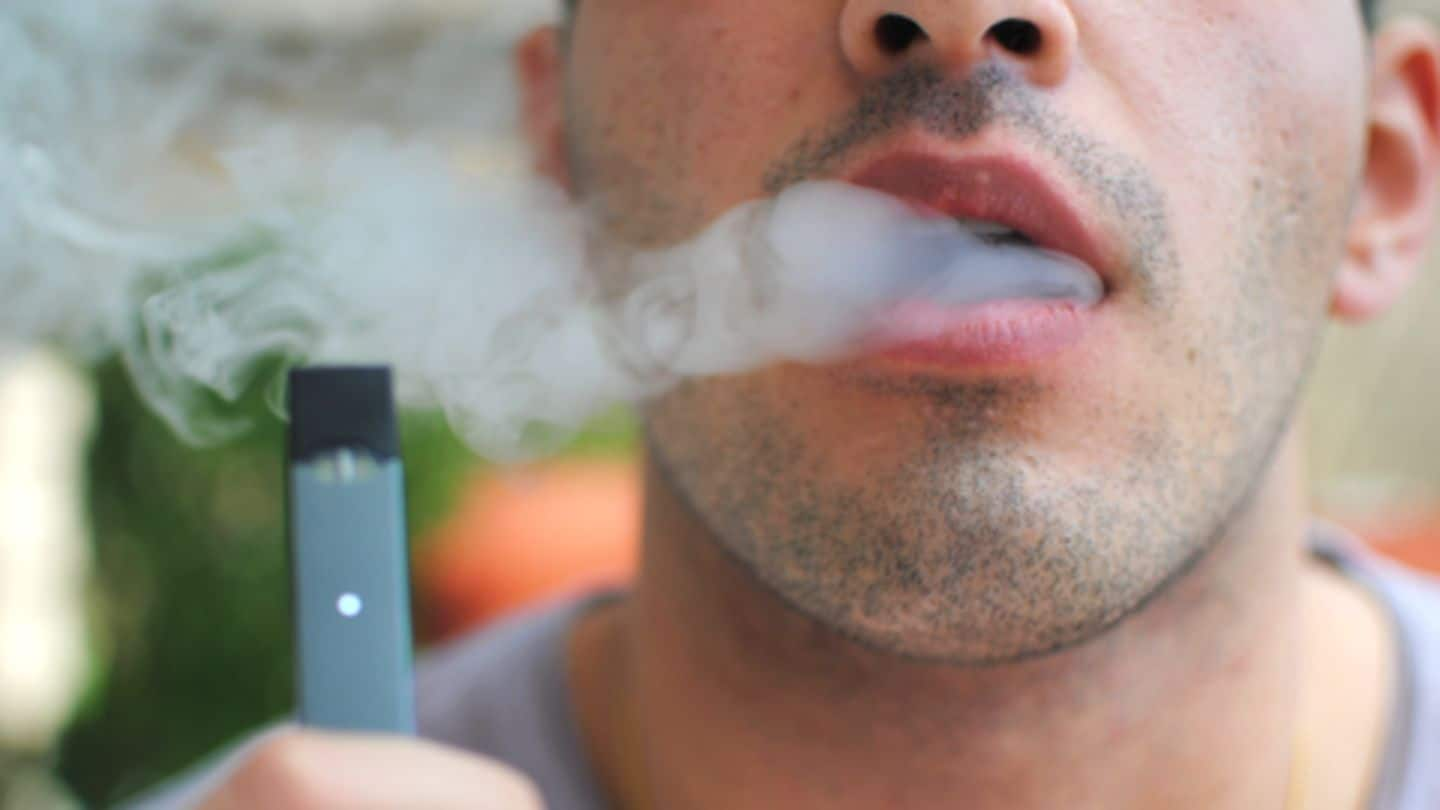
Why India is blocking JUUL, the popular fruity-flavored nicotine vape
What's the story
Recently, India's Health Ministry proposed a ban on the production and import of electronic cigarettes, citing health hazards. The Ministry is taking this rather seriously and proposed a jail term of up to three years and a fine up to Rs. 5L for repeat offenders. The proposed ban is likely to hit JUUL Labs, a leading e-cigarette company, hard. And it's about time something did.
Details
In 4 years of existence, JUUL fueled teen nicotine addiction
Founded in 2015, United States-based JUUL Labs Inc. has "revolutionized" vaping. With its sleek USB-drive design and easy-to-use pods, it has become a sensation in the US, especially among teenagers. And why wouldn't it? It looks cool and it doesn't produce a massive plume of vapor unlike other e-cigarettes, so it's pretty discreet. But with JUUL's popularity, teen nicotine addiction is on the rise.
Do you know?
JUUL was planning to launch in India; had hired executives
According to Reuters, JUUL Labs was looking forward to a launch in India, and had already hired several senior executives in recent months. Another American multinational cigarette and tobacco manufacturing company, Philip Morris, was also planning to launch its heat-not-burn smoking devices in India.
Nicotine content
One JUUL pod is equivalent to a pack of cigarettes
Now, vaping has always been perceived as more benign than smoking conventional cigarettes. As per JUUL's website, each 5% pod contains 40mg of nicotine (59mg/mL) while the 3% pods contain 23mg (35mg/mL). Separately, according to The New England Journal of Medicine, each 5% pod is equivalent to smoking 20 combustible cigarettes. Granted regular cigarettes have a greater variety of toxins, e-cigarettes aren't entirely innocent.
Health impacts
Nicotine associated with mental illnesses, increased heart disease risk
Although there has been no study focusing specifically on JUUL, certain studies conducted on various e-cigarette brands have discovered the presence of known carcinogens. Regardless, JUUL's nicotine content is enough to get someone addicted, and users can experience withdrawal symptoms (cravings, anxiety, irritability) if they don't keep smoking/vaping. Additionally, nicotine is also associated with mental illnesses, increased risk of heart disease, lung spasms, etc.
Information
JUUL increasingly becoming popular with middle and high schoolers
For teenagers and kids, especially, nicotine is known to affect brain development, which make them susceptible to lifelong complications. Yet, middle school and high school students are increasingly using e-cigarettes, according to a Centers for Disease Control and Prevention (CDC) report.
Advertising
To understand why that is, let's look at JUUL's advertising
Now, let's talk about JUUL and its deadly strategy. A 2019 Stanford study investigated JUUL's advertising strategy between 2015-2018. The study noted that JUUL advertised its products on Facebook, Instagram, and Twitter, and the "advertising prominently featured sweet and fruity flavors." Initially, JUUL got influencers to try out free samples and popularize the product. In fact, in 2015, JUUL chose Vice (the youth-media company) to launch its campaign.
Do you know?
JUUL's 'Vaporized' campaign featured 20-something models partying
Addressing the 'Vaporized' campaign, the study stated that the "targeting of youthful consumers was evident." Furthermore, most of their ads had vivid themes of romance and socialization, and featured happy 20-something models in partying. Yet, JUUL claimed that its target demographic was "adult smokers."
Course-correct
JUUL later launched anti-underage use campaigns. Too little, too late?
Despite the imagery, JUUL maintained their aim was to get adult smokers to "make the switch" to their less harmful vape, and launched campaigns to "combat underage use." In November, JUUL deleted its Facebook and Instagram, and started taming content on YouTube and Twitter. But JUUL's advertising had taken a life of its own. Young celebrities, influencers and memes were already talking about it.
Information
JUUL also restricted sale of flavored pods
JUUL also stopped selling select flavored pods at retail stores, restricting sales to their website, which comes with a caveat, discouraging users under the age of 21 to purchase their products with a pop-up. But we all know how effective that really is.
Popularity
In 2018, 3.6 million middle and high schoolers used JUUL
All this course correction is rather futile, though. JUUL products now represent 75% of e-cigarette sales at retail outlets and convenience stores. The company is valued at $38 billion. In 2018, the CDC estimated that around 3.6 million middle school and high school students were using e-cigarettes. With JUUL's anti-underage use campaigns evidently failing, several teens have sued the company after getting addicted.
Data
47% youth started using JUUL because of friends
Additionally, National Youth Tobacco Survey data revealed that one in five high schoolers is hooked on to JUUL. 47% of the youth said they used JUUL because their friends used them, 25% because it's less harmful, 29% for the flavors, and 21% for the "buzz".
More trouble
Illinois witnessed first death linked to vaping just recently
In September'18, the Food and Drug Administration described teen vaping as an "epidemic". In August'19, it reported to have received 127 reports of seizures or other neurological symptoms that occurred after vaping between 2010-2019. The World Health Organization also called for research and regulation on e-cigarettes, identifying JUUL. Recently, Illinois witnessed the first death linked to vaping. Surely, India got this ban right.